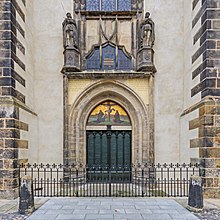This year Braunschweig is celebrating the 500th anniversary of the beginning of the Protestant Reformation in Europe. On Tuesday I collected a few brochures, as you can see above, which give information about the various exhibitions and concerts taking place throughout the year, to recognise the end of the Pope´s Catholic control of the church, and the beginning of the modern era of Protestant worship.
Martin Luther

The Ninety five Theses can be seen engraved into the door of All Saints' Church, Wittenburg. The Latin inscription above informs the reader that the original door was destroyed by a fire, and that in 1857, King Frederick William lV of Prussia ordered a replacement be made.
Martin Martin Luther was born to Hans Luder (or Ludher, later Luther) and his wife Margarethe (née Lindemann) on 10 November 1483 in Eisleben, Saxony, then part of the Holy Roman Empire. He was baptized as a Catholic the next morning on the feast day of St Martin of Tours. His family moved to Mansfield in 1484, where his father was a leaseholder of copper mines and smelters and served as one of four citizen representatives on the local council.
For more information please read:

According to one account, Luther nailed his Ninety five Theses to the door of All Saint's Church, in Wittenburg. Scholars Walter Krämer, Götz Trenkler, Gerhard Ritter, and Gerhard Prause contend that the story of the posting on the door, even though it has settled as one of the pillars of history, has little foundation in truth. The story is based on comments made by Philipp Melanchhon, though it is thought that he was not in Wittenberg at the time.


No comments:
Post a Comment